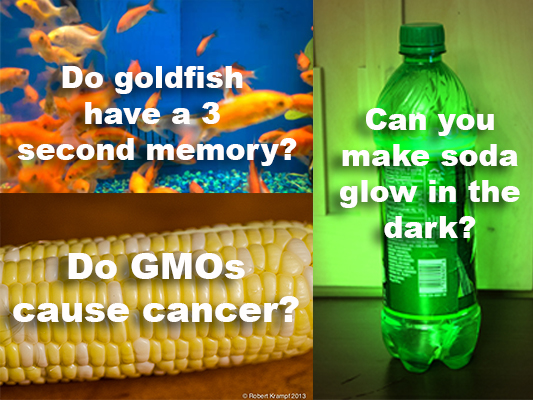This is part one of a series on posts on fact checking science related articles.
Read part two of this series. -- Part 3 - Part 4

The next time you log into your favorite social media site, take a moment to look at all the “amazing”, “shocking”, and “astounding” articles that your friends and family have shared. You’ll learn that your food contains horrible poisons, that some household chemical is a cleaning marvel, or that Mars is going to look as big as the Moon on a certain day.
Are those things true? They must be, because you saw it on the internet. They couldn’t say it on their website if it wasn’t true, could they? Of course they can. I can do it right here. I can say that the world economy is controlled by an invisible, pink unicorn named Norman. Does that make it true? No, of course not. His name is really Steve.
Why fact check?
Why should you verify information before posting it? Think about why you are sharing the information in the first place? Probably your goal is to inform other people about something you think is interesting or important. If the information is important enough to share, then isn’t it important enough to take a couple of minutes to make sure it is correct?
Rest assured that if you don’t fact check the information, someone else will. Posting misinformation on social media sites usually results in several people pointing out that your information is incorrect, misleading, or a pure hoax. Fact checking is a way to avoid looking foolish or gullible.
Misinformation also hurts your “cause”. If an organization has to use misinformation to make its point, most people will assume that they don’t have any real evidence for their position. If you are concerned about GMO’s, UFO’s, vaccines, magnetic fields, food additives, unicorns, etc., a quick way to make your entire viewpoint look ridiculous is to post inaccurate information. If you care about a cause, be sure to fact check what you post.
Why would someone post information that is wrong?
Well, there are several reasons.
- Some articles are trying to convince you to accept their viewpoint, and are willing to “bend the truth” a bit in the process. They are counting on confirmation bias (which we will talk about in a later post) to get you to accept what they say as fact.
- Some are using the misinformation to make money. Most websites make money by selling products, getting donations, or from advertisements on their site. If a misleading article can convince you to buy something, donate money, or even just come to their website to see their advertisements, then they make a profit. If you repost that false information, you are helping them earn money by misleading people.
- Some misinformation is produced by people who actually believe what they are saying. Everyone is entitled to their own opinion, but just because you believe that unicorns rule the world does not make it true.
- There is currently a fad of producing “fake science” articles and videos just for the purpose of tricking people into thinking they can pop popcorn with a cell phone, make carbonated sodas glow in the dark, or unlock a car door with an orange. Before you decide to use an internet video idea for a science project, a little fact checking can save you a lot of time, money, and frustration.
- Even the news media can be a source of misleading scientific information. This can be the result of over simplifying complex ideas, or trying to make a story more compelling. A common example is announcing that “Coffee cures cancer!” when the story is based on a single study with a small sample size, which produced results that indicate that there may be a possibility that drinking incredibly large amounts of coffee might increase the risk of cancer for lab rats.
Over the next few posts, we will be looking at warning signs that you need to fact check, and some quick fact checking techniques. I will also be taking a closer look at fact checking some of the most common misinformation that pops up on the internet.
